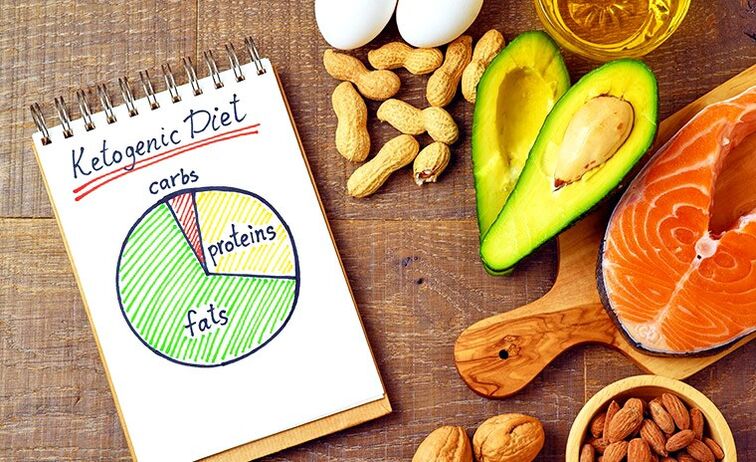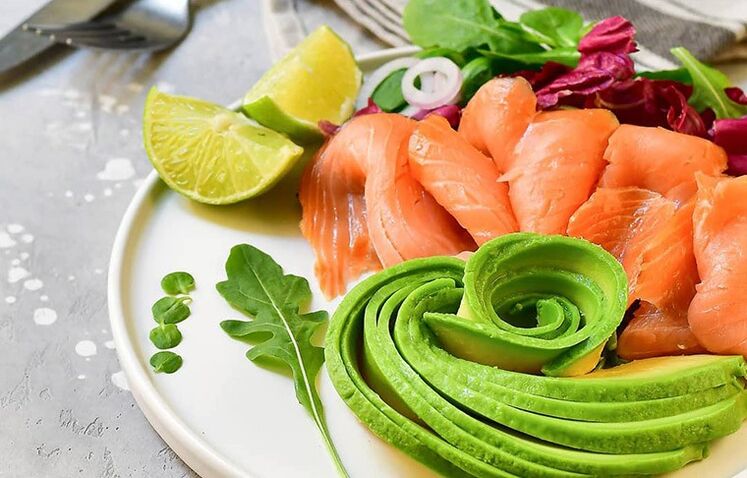
If, twenty or thirty years ago, someone put all the products in two baskets, arranging them according to the most useful and least useful principles, then today you should do a thorough review of it. The strangest story takes place at this time with the fat - the main enemy of mankind has recently not only been fully restored, but almost declared his savior. Is that so, nutritionist Chris More understands.
Recently, one patient admitted that she and her husband ate nearly a pound of meat a week - three pieces for breakfast, and then two more with a salad for lunch. I had worked as a nutritionist for over twenty years, and nothing seemed to surprise me, but at the time I still couldn’t help myself and asked: why? The patient said that her husband watched a TV show about the keto diet, and they decided to give it a try. Six months of using meat - and now the husband has lost nine kilograms and, according to his wife, is almost exhausted with energy flooding himself.
More and more, I hear from people about the miracles the keto diet does to them. They claim that it burns fat in the body, gives energy and overcomes disease, and from now on, not only possible, but also need to eat as much meat as you like. But all of their enthusiasm requires at least some serious testing-is a keto diet that doesn’t restrict animal fat intake really that good?
The Ketogenic diet is a low carb diet high in fat and moderate protein. It was initially used in the treatment of epilepsy in children by increasing the body’s levels of ketones in the blood.
What is ketosis?
Let’s start with the name of the diet: where does this "keto" come from? When the body is severely deficient in carbohydrates - for example, due to diabetes or prolonged starvation - it must break down its own fat more actively than usual to gain energy. Ketosis develops: metabolism is disrupted, and more ketone bodies than needed accumulate in the tissues. Body ketones are products of fat metabolism. They are produced by the liver when insulin levels drop in the blood.
"The liver makes the body ketones all the time, but the levels depend on the carbohydrates and proteins you eat - the body needs both, " explains Jeff Volek, a professor at Ohio University.
The breakdown of fat in the body of a healthy person and the formation of ketone bodies is a normal process, it is called ketogenesis. Unlike ketosis, ketogenesis does not cause dramatic weight loss. Ketosis is a pathology that, in addition to diabetes and prolonged fasting, can be caused by a keto diet, as it almost excludes carbohydrate foods from the diet. A person with ketosis loses weight abruptly, also due to several other pathologies.
A ketogenic diet forces the body to use fat as its main source of energy. Typically, this role is played by carbohydrates, which when taken with food, are processed into glucose, which is very important for nutrition and brain function. However, if the diet is low in carbohydrates, the liver converts fats into fatty acids and ketone bodies. Ketone bodies enter the brain and are used as a source of energy instead of glucose. Increased levels of ketone bodies in the blood (ketosis) cause a decrease in the frequency of epileptic seizures.
In the keto diet, the main part of the daily diet - from 60 to 80% - is fat, protein - about 15%, and only the remaining 10% is carbohydrates (this is about half of small bread). At first glance, this is like the Atkins diet, but the keto diet involves more severe carbohydrate restrictions, according to Spencer Nadolsky, author of The Fat Loss Prescription. Some theorists generally ensure that the fewer carbohydrates we eat, the more fat our bodies burn, and for this reason, metabolism improves, immunity increases - and in general, various miracles begin to happen in our bodies.
Yet, in normal life, we get about half of the calories, and not a tenth of them from carbohydrates. So, basically, the question is: can your body be in ketosis long enough to achieve the promised nirvana without serious health consequences? Are you really going to start getting fat with fat?
Is a keto diet right for you?
It may sound strange, but the best diet for you is the foods you normally follow. As for Volek, who has been using keto for twenty years, he’s fine, but is he right for you? Unfortunately, there is no research on what goes on in the body of someone who has long been on a keto diet. During the Weight Loss Study A to Z, scientists studied the Atkins diet, Zone, LEARN and several other diets, but in this study, female subjects consumed 25 to 35% carbohydrates - this is not even close to the 10% that advises limit yourself todiet keto.
The only thing known for sure: on a keto diet you will definitely lose weight. In Italy, in 2015, they studied the performance of people sitting on it, and on average over three months they lost about 10-12 pounds. A year earlier in Spain, it turned out that in a year this way you could lose about 20 kilograms. True, in the following year, subjects often returned to the weight they had before the experiment, once they underwent a rigid diet.
What would you eat if you decided to give it a try? First and second, the meat. The rest of the product, not much suits you. Starchy vegetables - potatoes, pumpkin, corn - are strictly prohibited, as are most fruits. Milk, nuts, rice and pasta should also be forgotten.
The keto diet is difficult to follow and can be harmful to some people. "Extreme diets, especially keto diets, are strictly contraindicated in people with neurodegenerative diseases such as epilepsy, " said Dr. Alan Aragon.
A ketogenic diet is considered optimal in society for weight loss. However, according to scientific evidence, the effects of weight loss immediately after switching to a ketogenic diet are due to a decrease in the amount of water in the body, and the amount of body fat is affected by energy balance. For weight loss, the energy supplied by food should be less than that spent in physical activity. One of the advantages of a ketogenic diet, like other low -carbohydrate diets, is that the ketosis that occurs with a low -carbohydrate diet contributes to weight loss in obesity. The difference in calories consumed can reach a thousand kilocalories a day compared to a low -fat diet. The effect of a ketogenic diet is highly dependent on the protein content in the diet.
Can I take medications that cause an increase in ketone bodies? No matter what. Don’t listen to "consultants" who will assure you that even without a diet, you can cause ketosis with the help of special medications.
So is a keto diet right for you or not? If you are an extreme athlete who is willing to experiment with your body, if you want to take risks and quick results are important to you, then give it a try! If you just want to lose a few pounds and in the past you’ve experienced the "yo-yo effect" (when, after a strict diet, a person loses weight and gains more weight than he or she manages to lose), then maybe you shouldn’t take the risk. However, if you approach the keto diet wisely, there are three lessons you can learn from it that will definitely come in handy.
- Reduce your "empty" carb intake. Analyze what foods you can get with a lot of your daily carb intake: if it comes from fruits that are rich in fiber and antioxidants, then it’s okay, but if your carbohydrate sources are sweets, sodas and any foods made with flourwhite, you know What to do: Don't send them to the trash.
- Don't avoid fat. The interest in low-fat foods that began in the 90s can be safely left in the past. There is nothing good about that. Often, to compensate for the lack of fat, manufacturers increase the amount of sugar in the product. Eat fatty fish such as salmon, mackerel, or sardines at least twice a week. And whatever you cook, don’t drink vegetables, especially good olive oil.
- Eat lots of vegetables. All vegetables and leafy greens go well with fatty and protein foods-fans of the keto diet eat a lot. And you do the same. Eat spinach, spinach, bok choy, arugula and other types of salads without restrictions.
What happened to my meat patient? Their experiments on nutrition continued right at the time their child was born. Of course, they immediately forgot about diet (there was no time to think about it, as the young mother explained). So remember: sooner or later you will get tired of inserting meat into yourself on a regular basis and you will go back to regular and regular food.
Recipe

Salmon and asparagus salad
Ingredients:
- 150 g salmon fillet;
- 80 g of green asparagus;
- 1/2 head iceberg lettuce;
- 2 eggs;
- 4 anchovies;
- 5 cherry tomato seeds;
- 5 large capers (or 6-8 small) - take capers in salt, not brine, must be washed before use;
- 1/2 medium -sized shallot;
- 6-8 Art. l. olive oil;
- 1 tablespoon mustard;
- juice of half a lemon.
How to cook:
- If you’ve ever cooked nicoise, you can also handle this salad. Practically repeating Nice’s main course, only fatty salmon is taken instead of tuna, and asparagus is used instead of green beans (however, you can also use beans).
- Salmon is cooked well not in a hot pan or in a hot oven, but steamed or in a slow cooker: 20-30 minutes at a temperature of 80-85 degrees, not higher (otherwise the protein will curve and the fish willit turns out to be difficult). But you can also fry in a pan (don’t overdo it! ) - the fish should be tender and maintain transparency in it.
- Cook the asparagus. It must be crispy, so don’t overcook! Cooking time depends on its size, so we do not recommend leaving the stove - asparagus cooks quickly.
- Place the dismantled iceberg on a plate (salad should be washed, dried and torn into medium -sized pieces), asparagus, salmon dismantled into large pieces, half of the cherry tomatoes, anchovies, capers, chopped onion into rings and boiled eggs (ideally, egg yolk should not remain liquid but soft). Top the field with olive oil sauce with Dijon mustard and lemon juice. You don’t need to wash with salt - anchovies and capers are already quite salty.
The ketogenic diet is used by athletes involved in sports that require endurance, such as ultramarathons, triathlons, cycling, and others. The body of athletes who adhere to this diet uses fat more efficiently as a source of energy and thus helps to preserve glycogen storage during prolonged exercise.
Bacon and lettuce salad
Ingredients:
- 2 palm -sized lettuce heads
- 100 g bacon;
- 8 stalks of mint;
- 1 egg yolk;
- 6 tablespoons. olive oil and a little more for frying;
- 1 teaspoon grained mustard;
- 1 tbsp. sherry vinegar.
How to cook:
- For this salad, you need to make a slightly more complicated sauce: put mint leaves and mustard in a tall glass, add egg yolks, pour sherry vinegar. Beat with a blender while adding the olive oil in a thin stream.
- Cut lettuce in half lengthwise and fry over high heat. It should be slightly caramelized, i. e. acquire a golden brown color, stay fresh and crunchy on the inside. Fry the meat over high heat without oil or in the oven until crisp. Place lettuce, smoked meat and sauce on a plate. Garnish with mint leaves.















































































